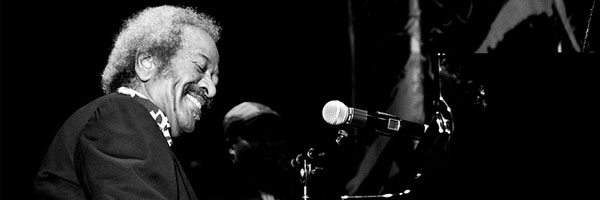Allen Toussaint, 1938-2015
Allen Toussaint, the influential New Orleanian musician called ‘legendary’ by Paul Simon and ‘a massive songwriting talent’ by Paul McCartney, has passed away at the age of 77.
Allen Toussaint did not grow up with the advantages many of us have had. Born in the working class neighborhood of Gert Town, Louisiana in 1938, with Jim Crow’s force continuing to press downwards, times were tough. But, though life was poor in opportunity and wealth, it was rich in music and spirit. The sound of New Orleans – the boogie-woogie, gospel choirs, buoyant jazz funerals, the “percussive frenzy” of the Mardi Gras Indians – had optimism and Toussaint held it close. After falling in love with the piano “at first touch”, Toussaint learned his craft through mimicking idols Ernest Pinn and Professor Longhair.
The young Toussaint had talent. Following several years playing high schools and bars with Snooks Eaglin, he became a session musician: occasionally filling in for Fats Domino on demand by Fats’s co-writer Dave Bartholomew (‘I Want You to Know’). It was not long before Toussaint was asked to release his own album, and soon came ‘The Wild Sound of New Orleans’– a pounding stream of hard-edged R&B instrumentals (‘Wham Tousan‘) with only brief breaks in course (‘Nowhere to Go’). Five years later, the song ‘Java’ was covered by Al Hirt and reached no.4 in the competitive 1963 market – shoulder to shoulder with The Beatles and Frankie Valli.
The sound of New Orleans – the boogie-woogie, gospel choirs, buoyant jazz funerals, the “percussive frenzy” of the Mardi Gras Indians – had optimism and Toussaint held it close.
During the 1960s, Toussaint turned to A&R, production, and writing for other artists. According to Deacon John Moore, “there isn’t a musician in town that wouldn’t speak highly of Allen because he did one thing – he paid them well for their services”. The early period saw Toussaint writing songs such as ‘Lipstick Traces (On A Cigarette)’, ‘Fortune Teller’ (later covered by The Rolling Stones, The Who, Iggy Pop, among others), ‘It’s Raining’, ‘Ruler of my Heart’ (later reinterpreted by Otis Redding), and productions including ‘I Like It Like That’, and ‘Ya Ya’.
In 1963, Toussaint was drafted into the military. Here he formed a band; jokingly writing ‘Whipped Cream’, only later for Herb Alpert’s version to be used for The Dating Game. However the army slowed momentum, and Toussaint, seeing musicians either knocked out of the race by the British Invasion or otherwise “all away round the track”, felt out of touch with the evolving pop sound. But rather than pulling the curtain down, Toussaint returned determined and adapted his writing. The next few years were fruitful: for instance, ‘Holy Cow’ (later covered by The Band) and ‘Get Out Of My Life, Woman’ (later covered by The Doors) were written, and ‘Cissy Strut’ and the album ‘Look-Ka Py Py’ (ranked no.216 on the Rolling Stone list of 500 Greatest Albums) by The Meters were produced.
The army slowed momentum, and Toussaint, seeing musicians either knocked out of the race by the British Invasion or otherwise “all away round the track”, felt out of touch with the evolving pop sound.
The following decade remained busy. For other artists, Toussaint wrote ‘Here Come the Girls’, ‘Transition’ for Lou Johnson (Toussaint considered this one of his best), ‘Freedom For The Stallion’ (later covered by Bob Dylan), horn arrangements for Paul Simon’s ‘Tenderness’ and The Band’s 1971 NYC Academy of Music concert, production for Bob Crew/Kenny Nolan’s ‘Lady Marmalade’, Gallagher & Lyle’s ‘Heart On My Sleeve’ (for Ringo Starr), and a performance on Paul McCartney’s ‘Rock Show’ at Toussaint’s Sea-Saint studio.
Furthermore, Toussaint released five albums of his own material. In ‘Toussaint’, Merry Clayton (the howls in The Rolling Stones’ ‘Gimme Shelter’) and The Meters give Toussaint’s pen its fullest expression: ‘Working On The Coal Mine’, ‘Sweet Touch of Love’, ‘Number Nine’.
The album ‘Southern Nights’ is considered Toussaint’s masterpiece. Storming in with the powerful ‘Last Train’ and ‘Worldwide’ then smoothening its way downstream with songs like ‘What Do You Want The Girl To Do?’ and ‘Back in Baby’s Arms’, there is little doubt that the praise is appropriately applied. Toussaint considered the song ‘Southern Nights’ – “a little movie of my life as a child” – his best, and Glen Campbell heard its merits too: inspired when listening to a rendition by Jimmy Webb, he released his own version which reached no.1.
In 2005, Hurricane Katrina hit New Orleans and Toussaint lost his home and studio. His response to the news of lost song manuscripts: “I’ll just have to write some more.” Such was the man.
In 2005, Hurricane Katrina hit New Orleans and Toussaint lost his home and studio. But he responded to the tragedy in his usual manner – the character revealed in ‘Optimism Blues’, ‘Gone Too Far’, and ‘Happiness’ – with strength and forbearance. Refusing to let the situation get the better of him, Toussaint busied himself with extensive touring and performances with artists such as Paul McCartney and Eric Clapton. Elvis Costello recalls Toussaint’s response to the news of lost song manuscripts: “I’ll just have to write some more.” Such was the man.
Forty years ago, Allen Toussaint asked us, “what is success”. No single characteristic can properly form the answer. But he who spends life giving without himself having been handed all of life’s luck or opportunity, who reacts to hardship with strength, stoicism and application, who finds and does something he loves, and who inspires people from close and afar, certainly is a successful man.

Comments